Two Trips and Two Grain Bins Later
Spring has decided to made its debut here in Minnesota! While the frost and a few sun deprived snow piles have yet to give out and the barn water is still frozen underground somewhere, the grass has made it's appearance again after five solid months of hiding. With Spring at hand, so comes a plethora of outdoor activities and projects. One of those projects, for us, has involved taking apart two 18ft diameter/18ft tall grain bins located off-site. Those two grain bins will be put to good use on our property next summer. If you have seen our house, you know well enough that we probably already have a few too many projects on our plate at the moment, so it will be good to delay the reconstruction of these bins just a little :)
Like this weekend, after hauling the rest of the grain bins to our homestead for storage, we pulled our taps from the trees as the sap dried up for the season. Finishing the syrup and cleaning the buckets, hoses, and taps followed...
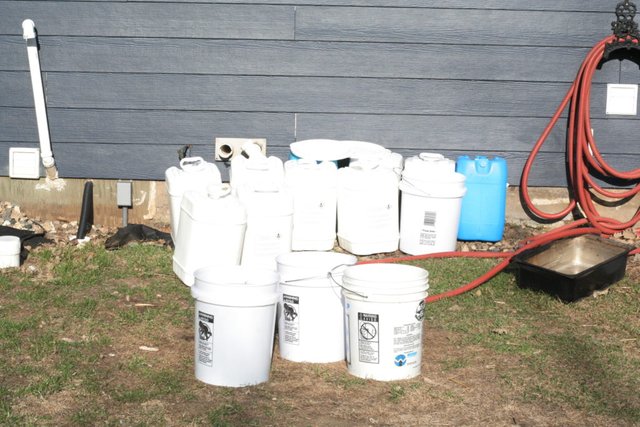
and cleaning more buckets...
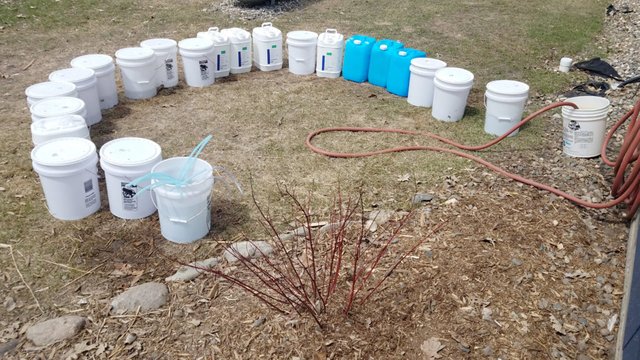
Then, there was picking rock from the field, setting the first gopher traps (which my oldest son is now capable of doing by himself!), and setting up our garage lighting on what is the humble start (1 panel) of our future and more ambitious 5kW solar system. The off-grid power has been awesome to have, not only to cut our power bill down a little, but also in situations like that of this weekend. Our power company ended up suffering a power outage that lasted several hours (to their credit, we had some miserable winds over the weekend).
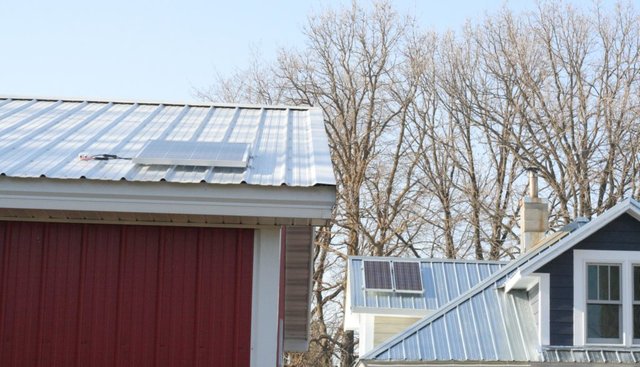
Thankfully, we were still able to move ahead on projects in the garage with our off-grid lighting, like clear-coating more of our house ceiling tiles, which demanded most of the available space in the garage to complete. Opening the garage doors for some natural light was out of the question as the wind raised havoc outside. Our freshly clear coated tiles would have been ruined in a hurry!

Anyway, that was a tangent.. back to the grain bins!
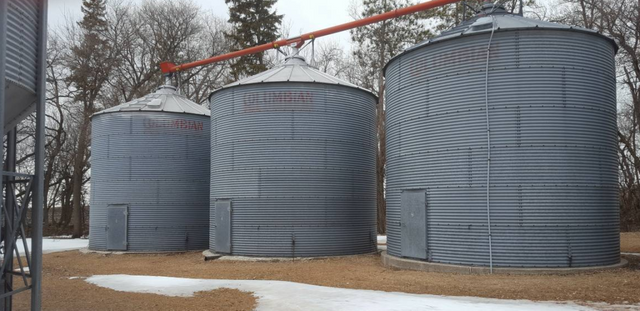
Last Saturday, my son, myself, and four friends made the hour and a half trek to the farm where the grain bins were located at, on the "BIG" day, bin-takedown-day! Going into this, none of us had ever disassembled a grain bin before. We also lacked the tools that are regularly used to take a bin down, like a boom truck or bin jacks. So, I think it is fair to say that none of else really knew exactly what to expect, and to the credit of my friends that came along for the ride, they took it in stride.
Leading up to the project, myself and a few friends watched a couple of bin takedown videos online. I also talked with a couple of people that had done this sort of thing before. A gameplan was formed and a date was set. Surprisingly, the whole project went pretty well and mostly to plan!
Tools
So here were the tools we used (there were plenty of others I brought along, just in case, but never used)...
(2) Air compressors and hoses
(3) Air impact tools with 1/2" sockets
(2) 1/2" wrenches
(1) Angle grinder with 5-6 cutoff wheels (for some stubborn bolts near the bottom to the bins)
(2) Sets of Scaffolding and planks
(1) 6ft ladder
(2) Extension ladders
(1) Hammer
(2) 2"x4"x16' (lumber)
(1) 2"x4"x8' (lumber), cut in half
(1) Screws and Driver (for setting up the 2x4 bracing)
(1) Vise grip and adjustable wrench to cover any misc/unexpected bolts
(1-2) cans of spray paint
(1-2) 5 gallon buckets for nuts and bolts
Magnet to assist in nut/bolt pickup
Extension cords
Process
After we reached our destination and unstrapped everything from the trailer, one of the guys took an extension ladder into the bins to mark each panel on the inside with spray paint, numbering them 1-32 (6 panels per ring, 6 rings). These markings will hopefully make putting these bins back together, just a little easier. Keep in mind that the lower panels are a thicker gauge and the panels get thinner as you reach the top.
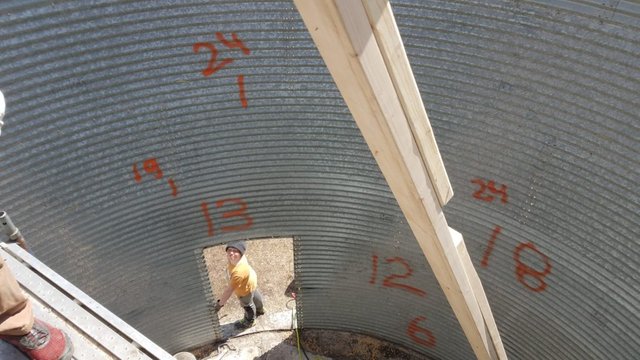
Another group of guys went to the task of removing the doors and door frames so we could get scaffolding setup inside.
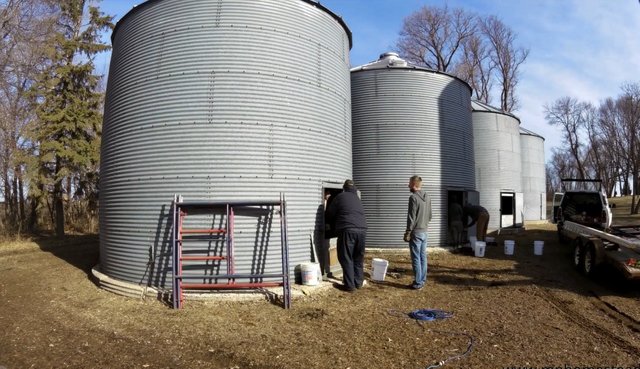
Once the doors were off, the scaffolding quickly went in and up.
The 2x4s were screwed together and used to brace the center of the bin ceiling to prevent the ceiling from succumbing to gravity once we started removing ceiling panels.
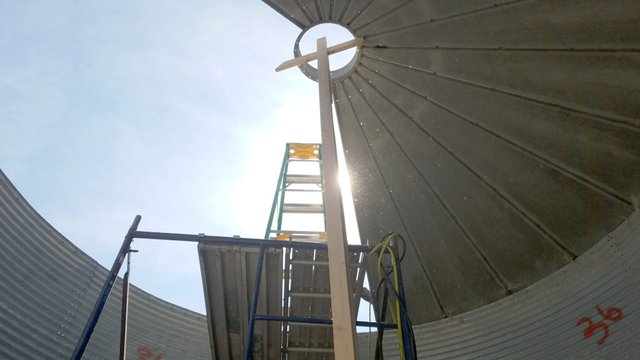
The next bit of work was the most challenging, getting the first roof panel off... Not challenging, as in physically difficult, but challenging, as in, figuring something out for the first time. All of the roof panels were bolted to the walls along the edge (eave). They were also bolted to each other along their seams. Finally, they were bolted to the top center ring, which was hidden under several pieces of flashing that had to be removed from the roof, from the outside, eighteen feet above ground level.
Once we figured out how the roof was held in place, one of the guys went around with a ladder and removed all of the bolts and nuts that held the roof to the wall along the eave, sans two or three to keep the roof from sliding around or giving into the forces of the the wind, in our case that day, a light 5mph breeze! The weather was amazing, highs hitting the mid 50's [deg F]!

While two guys worked on the roof, two others worked on removing about 50-75% of the bolts from the walls, keeping enough in to support the structure, but taking enough out to speed up the process as much as possible.
Others used magnets to pick up the bolts and nuts that were flying (both intentionally and unintentionally) all over the place and assisted in handling panels.
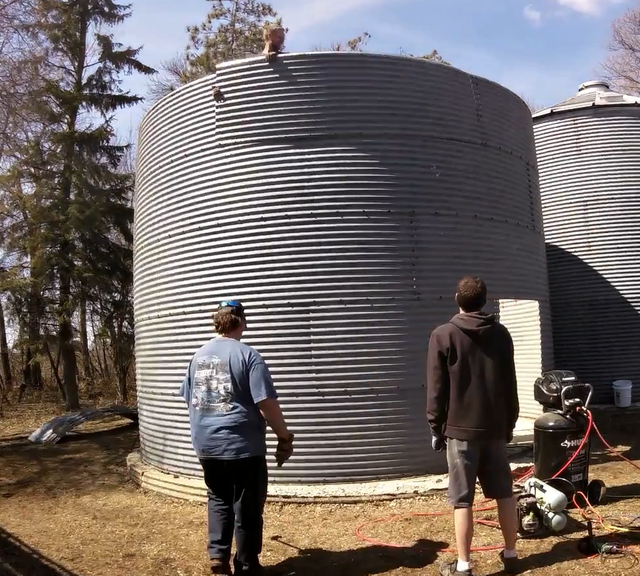
Once the roof was off, we worked to remove the wall panels as quickly as possible, setting them into stacks on the ground.

That first day, we were able to get one bin completely down and the second bin all down, except for the bottom three rings. The roofs went back home with us that night, along with the scaffolding and ladders. I thought about heading down the following day to finish taking down the second bin and loading up the panels, but my body protested as I rolled out of bed that morning, feeling muscles I didn't know existed. So then, I would wait until the following weekend. We had put in a long first day, departing my house at 6:30AM and arriving back at my house around 9:30PM.
A week later (this last weekend), my father and oldest son took the ride down with me to complete the job. I didn't get many moments like this with my grandfather, so I am extremely grateful that my son got to get in on this experience. I am sure he will remember this adventure with fondness. He was a hard worker and for most of the time, worked right alongside Grandpa. It took us about two hours (plus 3 hours of driving) to finish disassembling the second bin (this time, no scaffolding or extension ladders needed!) and load the wall panels from both bins onto the trailer, helped out with the assistance of the farmer we purchased the bins from (and his tractor with forks).
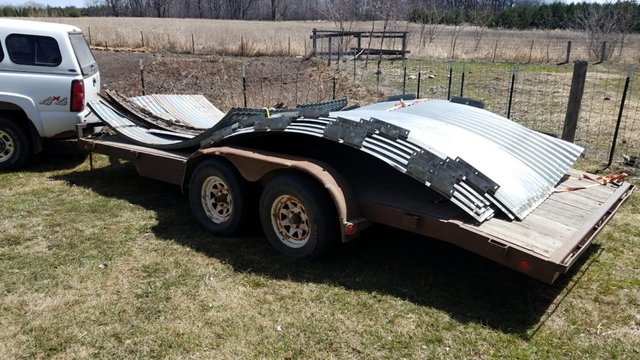
Once home again, my son and I unloaded all 72 panels from the trailer and stacked them in the barn where they will sit until next Spring, aided with the help of a little music and greeted with the occasional goat "MAAA!!!"
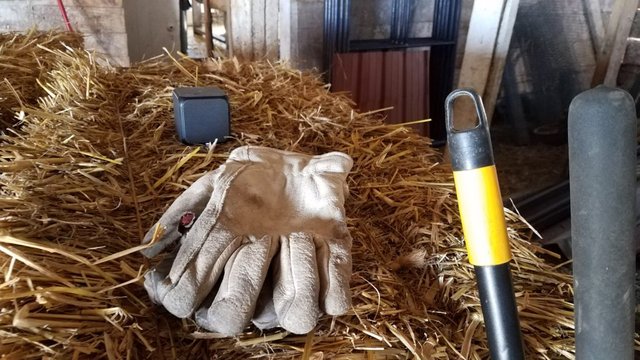
And, the timelapse video, or at least a significant portion of the takedown, before the camera battery went dead:
https://steemit.com/homesteading/@mnhomesteader/4nv36lty
-Jeremy
Blog: http://mnhomesteader.com/blog/
Facebook: https://www.facebook.com/mnhomesteader
Phew, that was a lot of effort but I am sure it was worth it! Give yourselves a pat on the back for a job well done!
Thank you @sotall!! I had plenty of help to make the load light(er) :D
By time you get them put back up you will be a group of pros. Nice job. Never easy taking on a task like that for the first time.
Thank you! For sure! The second one came down much faster than the first one! Although it will be harder to put them together than take them apart, at least they will be located just outside our house, rather than 1.5 hrs away :)